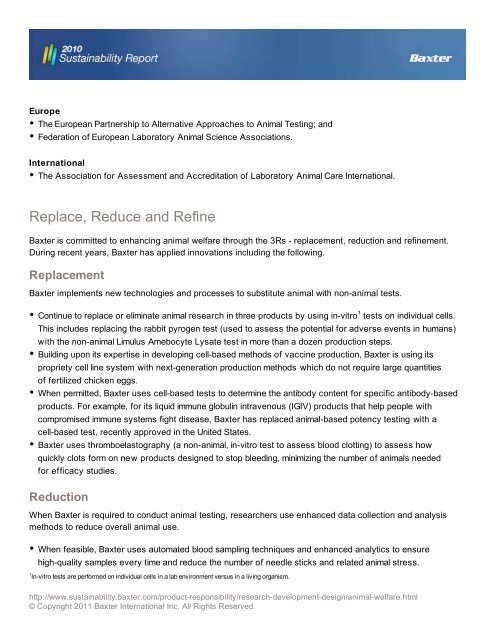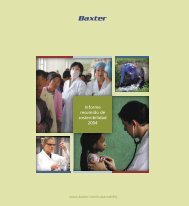Product Responsibility - Baxter Sustainability Report
Product Responsibility - Baxter Sustainability Report
Product Responsibility - Baxter Sustainability Report
- No tags were found...
You also want an ePaper? Increase the reach of your titles
YUMPU automatically turns print PDFs into web optimized ePapers that Google loves.
Europe• The European Partnership to Alternative Approaches to Animal Testing; and• Federation of European Laboratory Animal Science Associations.International• The Association for Assessment and Accreditation of Laboratory Animal Care International.Replace, Reduce and Refine<strong>Baxter</strong> is committed to enhancing animal welfare through the 3Rs - replacement, reduction and refinement.During recent years, <strong>Baxter</strong> has applied innovations including the following.Replacement<strong>Baxter</strong> implements new technologies and processes to substitute animal with non-animal tests.• Continue to replace or eliminate animal research in three products by using in-vitro 1 tests on individual cells.This includes replacing the rabbit pyrogen test (used to assess the potential for adverse events in humans)with the non-animal Limulus Amebocyte Lysate test in more than a dozen production steps.• Building upon its expertise in developing cell-based methods of vaccine production, <strong>Baxter</strong> is using itspropriety cell line system with next-generation production methods which do not require large quantitiesof fertilized chicken eggs.• When permitted, <strong>Baxter</strong> uses cell-based tests to determine the antibody content for specific antibody-basedproducts. For example, for its liquid immune globulin intravenous (IGIV) products that help people withcompromised immune systems fight disease, <strong>Baxter</strong> has replaced animal-based potency testing with acell-based test, recently approved in the United States.• <strong>Baxter</strong> uses thromboelastography (a non-animal, in-vitro test to assess blood clotting) to assess howquickly clots form on new products designed to stop bleeding, minimizing the number of animals neededfor efficacy studies.ReductionWhen <strong>Baxter</strong> is required to conduct animal testing, researchers use enhanced data collection and analysismethods to reduce overall animal use.• When feasible, <strong>Baxter</strong> uses automated blood sampling techniques and enhanced analytics to ensurehigh-quality samples every time and reduce the number of needle sticks and related animal stress.1In-vitro tests are performed on individual cells in a lab environment versus in a living organism.http://www.sustainability.baxter.com/product-responsibility/research-development-design/animal-welfare.html© Copyright 2011 <strong>Baxter</strong> International Inc. All Rights Reserved.
















